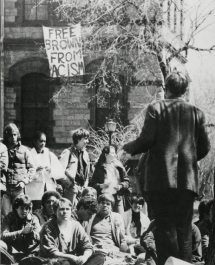Abstract
This interview with members of the Brown University class of 1985 summarizes the economically, socially, and racially diverse undergraduate experiences of Frances S. Lee, Suzanne Beth Goldberg, Margaret E. Rosen, Karen Smith, Allyson Tucker, Katherine Sabin Melchoir, and Jill Anne Hereford, at their 25th reunion.
First, the interviewees are asked why they chose to attend Brown and what their thoughts and experiences were concerning the “new curriculum” that abolished course requirements and allowed for a more open exploration of subjects.
They go on to recall fraternities being one of the major issues on campus for their lack of inclusiveness in terms of race and gender as well as the aggression they demonstrated towards Black and female students. Other issues discussed include Apartheid, Brown’s divestment from South Africa, and nuclear weapons. Specifically, the group recalls being deeply affected by a racially charged cover of the Brown Daily Herald and overt financial and institutional inequalities between men and women’s sports teams. Lee and Tucker Mitchell remember participating in protests against these discriminations.
The interviewees conclude with a conversation about how their different socioeconomic backgrounds may have affected their experiences.
This interview is particularly strong in illuminating racism and sexism on the Brown campus.
Recorded on May 29, 2010, Pembroke Hall, Brown University, Providence, RI.
Interviewed by Jane Lancaster
Suggested Chicago style citation: 25th Reunion, class of 1985. Interview. By Jane Lancaster. Pembroke Center Oral History Project, Brown University. May 29, 2010.
Biography
The Brown University class of 1985 was an active one. The votes of over 2,000 students passed a referendum urging the university to stock suicide pills for distribution in the event of a nuclear war and almost seventy students organized a protest against General Dynamics and Raytheon when they came for recruitment sessions.
Fed up with institutionalized racism, members of the Third World community joined with the Organization of United African Peoples in a series of protests that led to a takeover of the John Carter Brown Library and resulted in the administration agreeing to investigate the possibility of opening a Third World Center. Over 200 women lead a speak-out against sexism and sexual violence on campus, particularly from fraternities. That year, Theta Delta Chi was disbanded and Phi Delta Theta was evicted from the Wriston Quad because of their overt acts of violence against women, the closure of which generated protests from the Greek community.
A tumultuous time at Brown University, the class of 1985 experienced locally what the country experienced nationally.
